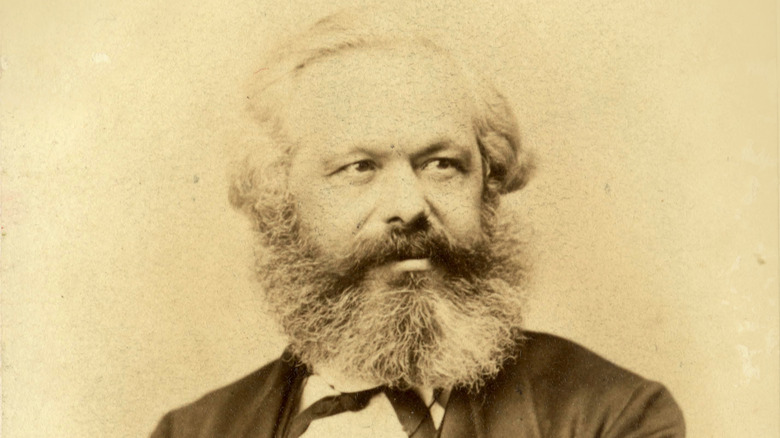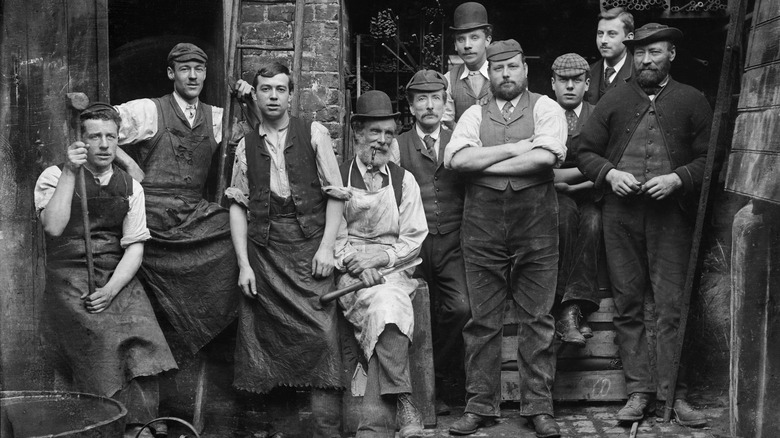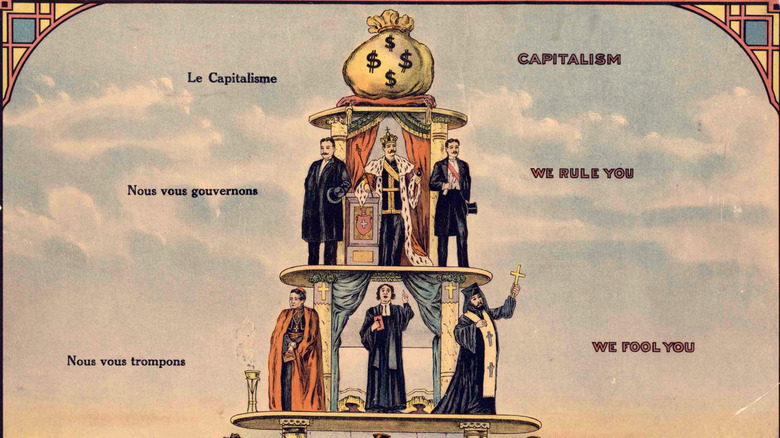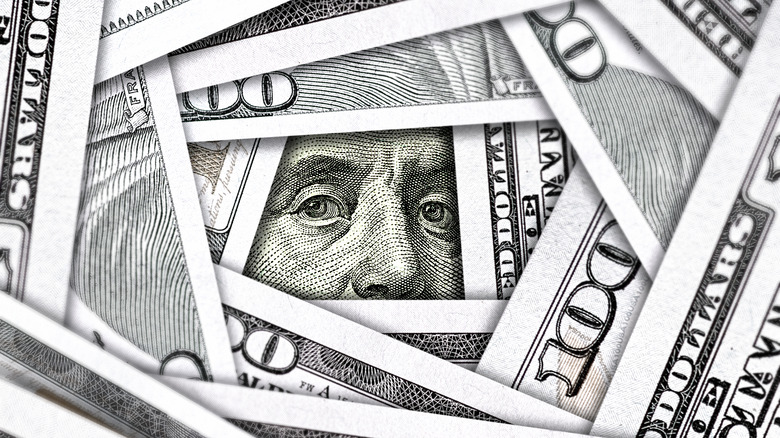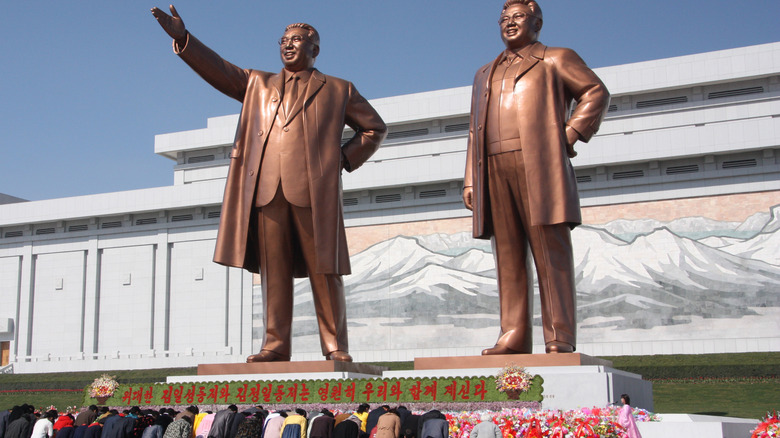Why Karl Marx Had Issues With Religion
The question is beyond commonplace by now: Does religion do more good for people than harm? Those on both sides can easily wield extremes to frame exaggerated, either/or conclusions. Critics can say something like, "Hey, how about those millions-killing crusades, huh?" and call sacred texts nonsensical fairy tales meant to soothe the weak-minded with stories of protective deities and frilly afterlives. Believers, regardless of faith, can say, "What do you think has kept humanity together all this time?" and call sacred texts the most valuable, time-honored method of communicating humanity's most relevant truths.
Unfortunately, such arguments demonstrate and perpetuate an ever-present human hang-up: Highly emotional issues shove people into camps that lack nuance of argument and produce thunderous echo chambers for the same-sided. There are plenty of other, far more complex perspectives on the function of religion in human society. And we say "function" intentionally. This article doesn't exist to discuss the truth or non-truth of particular theologies, but rather the role religious beliefs play in civilization.
On that point we turn to world-shaking 19th-century philosopher Karl Marx, who wasn't interested in simplistic "religion good or religion bad?" debates, as Learn Religions discusses. He took a step back and looked at all the talking heads and cults of personality built around demagogues thriving on the cash of those in their throes, and declared his oft-quoted phrase, "Religion is the opiate of the masses." But what did he mean by this? Take a breath, because it's deep dive time.
Workers of the world unite
Marx's views on religion and capitalism are one in the same. His views on capitalism took root during the mid-19th century industrial boom when horrifying working conditions drove the West from an agriculture-based economy to a manufacturing-based economy, as sites like History Crunch describe. Marx looked around and thought what every single factory worker then and now, grinding out 60 to 80-plus hours a week at a factory has likely thought: "This sucks. I do all the work, but that fat cat gets all the money?"
That sentiment is the backbone of the economic system we've come to call "communism." No matter how Marx's ideas got wielded by genocidal madmen like Joseph Stalin, Marx's central ideas remain rather sensible and sympathetic to, say, certain Amazon employees who've had to pee in bottles while driving: we exist in a society built on class struggle and economic abuse. "Workers of the world unite. You have nothing to lose but your chains," Marx said. Wage laborers — the proletariat in Marx's terminology — produce and produce, and give away what they produce, along with the sweat and labor of their lives, to the far less talented and far more wealthy. The latter people — the bourgeois in Marx's words — reap the rewards of an enslaved underclass, and need to be overthrown.
And what powerful tool did Marx say that the bourgeois wield to subdue the underclass? Why, the promises of religion, of course.
The opiate, not the caffeine, of the masses
So let's look at that original, widely popular Marx quote again: "Religion is the opiate of the masses." Marx didn't employ this comparison by accident. Religion is not the caffeine of the masses, in other words. Opiates relieve pain, induce euphoria, and also make people drowsy, as the National Institute on Drug Abuse explains. From Marx's perspective, there couldn't be a better description of the "alienation" from reality associated with religious belief, as Stanford University discusses. Many religions dissociate people from their actual, material lives in lieu of a blissful afterlife. People focus on "being good" (often conflated with "being right") in an abstract sense rather than working to improve physical, tangible work conditions and policies in our everyday world.
But there's a causal issue at work here, too. Marx's original 1843 work, "Contribution of Hegel's Critique of Right: Introduction," available to read at the website Marxists, describes how religion not only reinforces the separation of social classes but is created by material needs not being met. If one is, therefore "emancipated" from one's material needs — in Marx's view through an egalitarian utopia — then religion becomes irrelevant and unnecessary. Or as Marx succinctly wrote, "Man makes religion, religion does not make man." Or as he said in 1843's "Contribution of Hegel's Critique of Right: Introduction:" "Religion is, indeed, the self-consciousness and self-esteem of man who has either not yet won through to himself, or has already lost himself again."
We rule you, we fool you
Let's dig a bit deeper into the details of Marx's views on religion. As "Contribution of Hegel's Critique of Right: Introduction" describes (via Marxists), and Learn Religion outlines, yes, Marx grants that religious beliefs do provide some sort of transient happiness. But, it's the happiness of illusion. This means that a) the illusion can be extinguished, and b) religious belief is a type of "intellectual error" that can be corrected by persuasion (via Stanford University).
Both of these statements, however, assume a shockingly optimistic view of humanity. Marx's entire corpus, in fact, and his belief that the working class will just spontaneously one day rise up, can be seen as stunningly naïve. Folks with three kids and who work five jobs? They probably don't have the wherewithal, let alone energy, for a revolution. Also, we all know the red pill, blue pull conundrum from "The Matrix," right? Some folks are simply not going to care about abolishing their illusory comforts.
Despite all this, Marx wasn't strictly what we'd call an "atheist." As "A Companion to Atheism and Philosophy" writes (quoted by the Wiley Online Library), Marx just thought it was absurd to investigate lines of religious inquiry at all. As Learn Religions cites, Marx believed that religion is ultimately impractical and irrational, strips people of dignity and replaces it with the power of fictional cosmic entities, and is hypocritical because it's so often wielded by oppressors.
The abuses of laissez-faire capitalism
From here — because no one's opinions exist outside of context — it helps to go back to the world that Marx inhabited at the onset of the Industrial Revolution during the early-to-mid 1800s. Back then "laissez-faire capitalism" abounded — the ideological offshoot of what we now call "classic liberalism," as History Crunch explains. "Liberal" in this case means maintaining a hands-off approach to private enterprise. Big business owners wanted the government to keep its nose out of business operations. Those employers then got away with whatever abuses they wanted. If someone lost a limb in a factory? "Whoops, not my problem."
It would take over 130 years of relentless activism — from the 1820s to the 1950s — to get all the basic customs regarding humane labor that we now take for granted: OSHA health and safety regulations, child labor laws, sick leave, break times, healthcare options, mandatory holidays, and so forth. In the United States, this largely happened through labor unions and a "power of the worker" approach to governmental policymaking, as History outlines. And whose philosophy do you figure inspired such actions? Karl Marx.
Marx's outlook was, in fact, fundamentally sympathetic towards others. Despite sounding antagonistic towards religious belief, he purported a parental "I'm telling you this for your own good" outlook. To paraphrase Learn Religions, his view of religion could be summarized as, "Why are you dreaming about God when actual people are suffering?" or, "Religious belief is distracting you from economic betterment."
Lasting real-world consequences
Because all good things apparently end in tragically ironic reversals, we've now got to take a look at the global regimes inspired by what began as Karl Marx's pretty common sense "treat workers better" tagline. While Marx never engineered a cohesive, blow-by-blow blueprint for a real-life governmental system, others took his theories and ran with them. They wielded the term "communist" that Marx deployed in 1848 when he published, "The Communist Manifesto" (via the Conversation).
Vladimir Lenin was the first to try to implement Marx's ideas in a practical sense. After a brief seven-year period of peace following the Bolshevik Revolution of 1917, Lenin gave way to the absolute tyrant and mass-murderer Joseph Stalin in 1924, as History recounts. Stalin spearheaded the Soviet Union's ultimately short-lived 70-year-long existence, which in turn spawned other communist nations and dictators like China's Mao Zedong, North Korea's Kim Jong Il, Cambodia's Pol Pot, Vietnam's Ho Chi Minh, and many more, as Vintage News outlines. These men were responsible for untold suffering and millions upon millions of deaths, and all of them claimed to act in the interests of protecting the low, working-class members of society.
And all of these regimes? They were at least atheist, and sometimes anti-religious, as the Wall Street Journal discusses. Each of them substituted for the divine a single, charismatic, god-like leader who adopted the same role. Such is apparently the ultimately sad, horrible, and inadvertent consequence of, as Marx might put it, removing the opium from the people.
